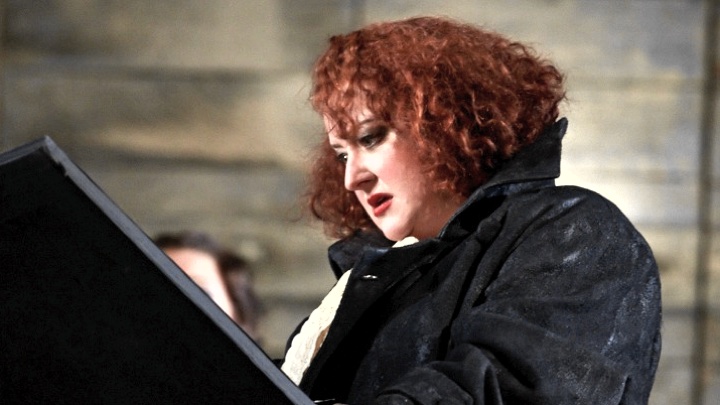
By the standards the evening set, it was a very competent debut (and a role debut, from what I can discern from her online biography). She’s more subtle, fluid, introverted than many a famous atomic bomb-take on the scheming sorceress, with a soft-grained tone that maintains an evenness despite its slightly bottled quality.
While the role’s lower notes draw attention to her natural register break, she avoided sliding into declamation and only occasionally looked pressured to press her high notes into competition against the massive orchestra (led by Patrick Furrer with detail yet—gratefully—less overwhelming volume than it might have been by his boss). “Entweihte Götter!” was ejected with witchy polish.
Understandably, despite an assured take on the character, much of her performance seemed like a one-sided duet with the prompter’s box, though this could also be a trait of François Girard’s center-stage, direct address Personenregie.
I won’t add to the pile on of Girard’s production (though the 40-under-40 audience was audibly laughing at the over-serious “wanna buy a watch?”-style robe choreography), but beyond the production’s glaring drawbacks, its manipulations of the piece’s visual and musical dimensions are sincere and, dare I say, effective inquiries into Lohengrin’s nuanced relationship with its audience’s subjectivity. What’s more, I can’t think of a better production to be dropped into at the last minute.
Elsewhere in the evening, Piotr Beczala gave the best performance I have ever heard from him with nuance, lyricism, and earnestness. As a die-hard Sándor Kónya Lohengrin fan, I found myself not-at-all disappointed by Beczala’s career-best performance. Tamara Wilson, too, sang with particular poise, though one spent much of the performance with the sense that she was holding something of her voice’s amplitude back.
Günther Groissböck lacked even a sliver of tact as Heinrich and Yevgeny Nikitin as Telramund was a supportive, if rather nondescript, partner to Nash. Brian Mulligan, as the herald, sounded significantly less than his usual best, and nobody is costumed flatteringly.
Yet most refreshing was the much-lower-than-average age of the audience; intermissions were buzzier than I’ve known them to be on an average night at the Met and even after nearly five gratifying hours, the audience seemed engaged and enthusiastic. Along with the high-quality performance, it was a fine antidote to a rainy night at Lincoln Center.
Photo: Philip Newton



